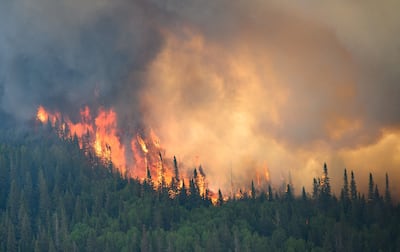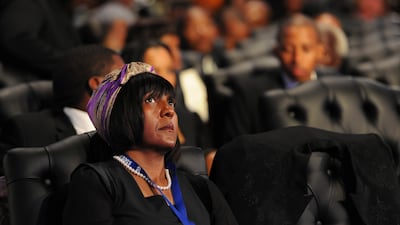The leadership of the UAE at Cop28 is a milestone and any moves to shun the global climate summit in Dubai will have adverse repercussions for climate action talks, Ndileka Mandela, granddaughter of South Africa’s late leader Nelson Mandela, has said.
Though climate campaigners and environmental groups are encouraging more action, calls by some to turn away from Cop28 are “reaching a crescendo”, Ms Mandela wrote in an opinion piece for Bloomberg on Wednesday.
“Dismissing it outright could cripple pivotal global negotiations – especially those regarding the welfare of Global South nations on the front lines of climate change, many in my home continent of Africa.”
Ms Mandela, a writer and a social activist, heads one of South Africa’s most prominent rural upliftment organisations, the Thembekile Mandela Foundation, which focuses on education, health, youth and women’s development in countryside villages, according to her profile on Bloomberg.
She is on the board of several non-government and philanthropic organisations including G-Global for the youth contribution to the implementation of the UN-SDG-2030. She is also on the advisory board of Crypto Credit Society, according to her LinkedIn profile.
World leaders, government officials, policymakers and top executives from the financial and corporate world will arrive in the UAE in less than 100 days for the Cop28 UN climate summit.
They will attempt to tackle the escalating emergency by trying to agree on ways to halt global warming, adapt to a changing climate and decide on who should foot the bill for the damage already caused.
The crunch talks will run from November 30 to December 12 at Expo City Dubai.
Cop28 is vitally important as it is the first summit that will evaluate the progress made since the Paris Climate Agreement in 2015, which calls for action to limit temperature rises to 1.5°C on pre-industrial levels.
Pledges to keep the goal alive would be assessed every five years. This is known as a “global stocktake” and will take place for the first time at Cop28, which Denmark and South Africa have been asked to assist with.
Dr Sultan Al Jaber, Minister of Industry and Advanced Technology, and Cop28 President-designate, earlier this year said the 1.5°C goal would be the “north star” that guides the summit. But it won't be easy.
UN Secretary General Antonio Guterres last month said the age of global warming had ended and the era of “global boiling” had begun.
The UAE, the Arab world’s second-largest economy, has already set its own ambitious climate agenda and aims to reach carbon neutrality by 2050.
The country has raised its target for emissions cuts to 40 per cent by the end of this decade, up from 31 per cent.
The UAE is targeting investments of up to Dh200 billion ($54 billion) in renewable energy, as it aims to “triple the contribution of renewable energy in the coming seven years”, Sheikh Mohammed bin Rashid, Prime Minister and Ruler of Dubai, said last month.
Ms Mandela said: “For the first time, a major national oil producer has publicly demanded that the world agree to a 'phase down' of fossil fuels by 2050.
“And that call to reduce oil, gas and coal production is on the agenda even before Cop begins.”

Also important is the UAE’s appeal to triple global renewable energy capacity by 2030, and then double it again by 2040, she said.
“Is this fast or big enough to avoid climate change? No. But it’s more ambitious than the European Union’s renewable energy plans and no previous UN climate summit has come near to endorsing such a goal,” she added.
Environmental and climate action groups are calling for the complete “phase out” of fossil fuels, and even Mariam Al Mheiri, Minister of Climate Change and Environment, earlier this year acknowledged the need to “phase out oil and gas in a just way”.
However, “rightly demanding more doesn’t mean we should lose sight of the stunning implications of what the UAE’s Cop presidency calls for”, Ms Mandela said. This year is also the first time a Cop presidency is “putting its money where its mouth is on climate financing for developing nations”, she added.
Last year, the UAE launched the Partnership for Accelerating Clean Energy with the US, catalysing $100 billion for 100 new gigawatts of clean energy in the US, UAE and the developing world by 2035.
Masdar, the UAE’s clean energy company, which Dr Al Jaber founded in 2006, is rapidly becoming one of the biggest investors in renewable energy across Africa.
“Which Cop presidency has ever done anything like this?" Ms Mandela said. "Yes, western politicians are right to ask hard questions of an oil producer in charge of a climate change summit. But my question to them is this: What have you done to help Africans fight climate change?”
Previous Cop summits have also struggled to bring climate-financing pledges to the table and the $100 billion pledged at the last meeting, which still remains undelivered, is grossly insufficient.
Dr Al Jaber has also endorsed the radical Bridgetown Initiative, created by Barbados Prime Minister Mia Mottley to free up as much as $1 trillion in climate financing, 10 times more than has been pledged, she said.
If ratified at Cop28, the plan would make it easier for developing nations to fight global warming while postponing debt repayments during climate disasters. Green campaigners calling to shun Cop28 “could harm developing countries that need climate financing”, Ms Mandela said.
If governments refuse to participate in key negotiations, “we will not be able to get the global deals we need to push these initiatives through”, she added.


